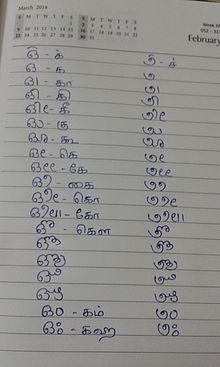Badaga language
This article needs additional citations for verification. (June 2020) |
| Badaga | |
|---|---|
| படக, ಬಡಗ, ബഡഗ | |
| Native to | India |
| Region | The Nilgiris, Tamil Nadu |
| Ethnicity | Badaga |
Native speakers | 134,000 (2011 census)[1] |
Dravidian
| |
| Tamil, Kannada, Malayalam | |
| Language codes | |
| ISO 639-3 | bfq |
| Glottolog | bada1257 |
Badaga is a southern Dravidian language spoken by the Badaga people of the Nilgiris district of Tamil Nadu. The language is closely related to the Kannada language with heavy influence from the Tamil language.[2] Of all the tribal languages spoken in Nilgiris (Badaga, Toda language, Kota language (India)), Badaga is the most spoken language.
Origins
[edit]Badaga, like modern Kannada, likely originates from Old Kannada. This is suggested by the fact that Badaga shares many common features with modern Kannada. One such feature shared by both Badaga and Kannada is initial /h/ where other Dravidian languages, and Old Kannada, have an initial /p/, a process which began around the 13th century.[3]
Phonology
[edit]Badaga has five vowel qualities, /i e a o u/, where each of them may be long or short, and until the 1930s they were contrastively half and fully retroflexed, for a total of 30 vowel phonemes.[a] Current speakers only distinguish retroflection of a few vowels.[4]
| IPA | Gloss |
|---|---|
| /noː/ | disease |
| /po˞˞ː/ | scar |
| /mo˞e˞/ | sprout |
| /a˞e˞/ | tiger's den |
| /ha˞ːsu/ | to spread out |
| /ka˞˞ːʃu/ | to remove |
| /i˞ːu˞˞/ | seven |
| /hu˞˞ːj/ | tamarind |
| /be˞ː/ | bangle |
| /be˞˞ː/ | banana |
| /huj/ | to strike |
| /u˞˞j/ | chisel |
Note on transcription: rhoticity ⟨◌˞⟩ indicates half-retroflexion; doubled ⟨◌˞˞⟩ it indicates full retroflexion.
| Bilabial | Alveolar | Retroflex | Palatal | Velar | Glottal | ||
|---|---|---|---|---|---|---|---|
| Nasal | m | n | ɳ | ɲ | ŋ | ||
| Stop | voiceless | p | t | ʈ | c | k | |
| voiced | b | d | ɖ | ɟ | ɡ | ||
| Fricative | s | h | |||||
| Approximant | ʋ | l | ɻ | j | |||
| Trill | r | ||||||
Writing system
[edit]Several attempts have been made at constructing an orthography based on English, Kannada and Tamil. The earliest printed book using Kannada script was a Christian work, "Anga Kartagibba Yesu Kristana Olleya Suddiya Pustaka" by Basel Mission Press of Mangaluru in 1890.[6]


Badaga can also be written in the Kannada script and Tamil script.
Linguistic documentation
[edit]Badaga has been studied and documented by linguists. Several Badaga-English Dictionaries have been produced since the latter part of the nineteenth century.[7]
A collection of proverbs and other traditional sayings of the Badaga has been collated and edited by Paul Hockings.[8] It is the result of the work of many people, collecting material over many decades.
References
[edit]- ^ Badaga at Ethnologue (24th ed., 2021)

- ^ Hockings, Paul (2004), "Badaga", in Ember, Carol R.; Ember, Melvin (eds.), Encyclopedia of Medical Anthropology: Health and Illness in the World’s Cultures Volume I: Topics Volume II: Cultures, Boston, MA: Springer US, pp. 572–578, doi:10.1007/0-387-29905-x_57, ISBN 978-0-387-29905-1
- ^ Emeneau, M. B. (28 February 2024). "The Vowels of the Badaga Language". Language. 15 (1): 43–47. doi:10.2307/409407. JSTOR 409407.
- ^ "Badaga". UCLA Phonetics Lab. Retrieved 9 May 2013.
- ^ "Word List for Badaga". UCLA Phonetics Lab. Retrieved 9 May 2013.
- ^ The Gospel of Luke in Badaga (PDF). Basel: Basel Mission Press. 1890.
- ^ Paul Hockings, Christiane Pilot-Raichoor (1992). A Badaga-English Dictionary (Reprint ed.). Mouton de Gruyter. ISBN 978-3-11-012677-8.
- ^ Hockings, Paul. "Counsel from the Ancients." A study of Badaga proverbs, prayers, omens and curses. Berlin, Mouton de Gruyter (1988).
- ^ Emenau (1931) reports no tokens of /i˞˞/, but suggests this is an accidental gap.
Relevant literature
[edit]- Hockings, Paul. Counsel from the ancients: A study of Badaga proverbs, prayers, omens, and curses. Mouton de Gruyter, 1988. Archive.org
External links
[edit]- Online community of Badagas worldwide
- Badaga literature
- A website on the Badaga
- Audio recordings in Badaga, with annotations in trilingual format (Badaga, English, French) Archived 9 November 2019 at the Wayback Machine – transcribed and translated by C. Pilot-Raichoor – site of the Pangloss Collection, CNRS-LACITO
